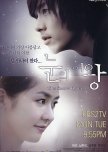This review may contain spoilers
A marvelous story of indissoluble love
A poignant drama, permeated with a deeply felt melancholy that accompanies us from beginning to end, The Snow Queen continues to be, in my opinion, a marvelous story of indissoluble love, capable of transcending any barrier, pushing (in all senses) towards extreme borders (not only figuratively speaking) thanks to the sincere romanticism of a practically perfect script and an excellent direction (the author is the same director of 'Winter Sonata', to be clear)
As always, love, chance and destiny are preponderant elements that drive the story forward, but compared to similar cases, one does not turn one's nose up at any inconsistency, illogic or magnanimous demands for complete suspension of disbelief, since everything manages to be coordinated in a balanced and 'realistic' structure that also guarantees a sentimental identification with the beautiful characters of the drama...
The composite screenplay manages to overcome a linear storyline with a concentric structure, full of randomness and coincidences, alternating points of view, even narrative variations on the same theme, as well as subplots and geometrical plotlines that enrich the construction of the story, where even a few symbols or simple objects such as a pager, a music tape and a couple of photographs have the strength to release sincere emotion without trespassing on the pathetic.
It is achieved without falling into the baroque or exaggerated mannerism (typical of many contemporary dramas) that sometimes makes us raise an eyebrow or roll our eyes, thanks to skillful and never ordinary dialogue of obvious literary derivation, capable of arousing equal passion for two apparently antithetical subjects such as mathematics and boxing, and this is also possible thanks to a perfect cast in an absolute state of grace.
Hyun Bin renders his character's torment and remorse very well, with a truly calibrated, touching and involving performance, a prisoner of his own secret and bearer of an inner suffering bordering on self-destruction, almost Catholic in nature, even though the religious references (much more marked in other dramas of the same period) remain confined to a desperate prayer/invocation towards the end of the drama. Yu-ri -very gorgeous! -is absolutely perfect, capable of operating a sort of progressive transformation and dramatic growth that is functional to the narrative development of the story; the bumptious and spoilt little girl of the beginning of the story, ends up evolving and becoming a mature (young) woman, consciously resigned, in spite of herself, to her own fate.
The remaining cast is perfectly integrated in their roles without any pedantic backstory that in this case would frankly be considered pleonastic, with the exception of the excellent portrayal of Tae Woong's mother, who is absolutely decisive in further accentuating the protagonist's torments, and Bo Ra's father, capable of confirming once again that founding principle of dramas whereby the faults of parents end up falling on their children (in fact, he is responsible for the tragic fate of his eldest son)
Much has been written, and rightly so, about the extraordinary venues of the story, and the skillful use of the locations really deserves a separate mention, starting with the extraordinary landscapes in the opening, later reproposed in the last episode, to continue with the gymnasium, a sort of perfect microcosm populated by a group of marginalized people with a warm heart, which restores to us all the sense of sadness that lingers in the (icy!?) heart of the protagonist; Bo Ra's house, almost a gilded prison, up to the basketball court that returns also in the heartbreaking finale...
As is common in other productions, the role of nature is central, both in the snowy sequences and in those where it is the sea that increasingly, almost overwhelmingly, emphasizes the lyricism of the drama; for example, the sequences at the grave of the friend/brother, which personally have always made me think of my favorite Murakami Haruki book, 'Norwegian Wood' ...
Touching and melancholic without ever being intrusive, the soundtrack is the further strength of this extraordinary drama, a kind of contemporary fairy tale that is a truly perfect transposition of Andersen's sadly melancholic universe...
I decided to re-watch this gem a distance of a few years, after, what an irony for a drama-fan such myself! Fate has stripped me, in a short space of time, of some of the most beloved people who have accompanied my life... When one loses, affections, loves, friendships, beyond the pain and inner wounding, one questions oneself and seeks answers as to why things happen...
Just like the characters in the drama, we are constantly asking ourselves many questions, and the reflection on the differences between mathematics, which is always able to provide answers, and life, which acts by chance and very often does not provide answers, is perhaps the best possible metaphor or the perfect theorem to sum up not only this drama, but the lives of many people...
10/10
As always, love, chance and destiny are preponderant elements that drive the story forward, but compared to similar cases, one does not turn one's nose up at any inconsistency, illogic or magnanimous demands for complete suspension of disbelief, since everything manages to be coordinated in a balanced and 'realistic' structure that also guarantees a sentimental identification with the beautiful characters of the drama...
The composite screenplay manages to overcome a linear storyline with a concentric structure, full of randomness and coincidences, alternating points of view, even narrative variations on the same theme, as well as subplots and geometrical plotlines that enrich the construction of the story, where even a few symbols or simple objects such as a pager, a music tape and a couple of photographs have the strength to release sincere emotion without trespassing on the pathetic.
It is achieved without falling into the baroque or exaggerated mannerism (typical of many contemporary dramas) that sometimes makes us raise an eyebrow or roll our eyes, thanks to skillful and never ordinary dialogue of obvious literary derivation, capable of arousing equal passion for two apparently antithetical subjects such as mathematics and boxing, and this is also possible thanks to a perfect cast in an absolute state of grace.
Hyun Bin renders his character's torment and remorse very well, with a truly calibrated, touching and involving performance, a prisoner of his own secret and bearer of an inner suffering bordering on self-destruction, almost Catholic in nature, even though the religious references (much more marked in other dramas of the same period) remain confined to a desperate prayer/invocation towards the end of the drama. Yu-ri -very gorgeous! -is absolutely perfect, capable of operating a sort of progressive transformation and dramatic growth that is functional to the narrative development of the story; the bumptious and spoilt little girl of the beginning of the story, ends up evolving and becoming a mature (young) woman, consciously resigned, in spite of herself, to her own fate.
The remaining cast is perfectly integrated in their roles without any pedantic backstory that in this case would frankly be considered pleonastic, with the exception of the excellent portrayal of Tae Woong's mother, who is absolutely decisive in further accentuating the protagonist's torments, and Bo Ra's father, capable of confirming once again that founding principle of dramas whereby the faults of parents end up falling on their children (in fact, he is responsible for the tragic fate of his eldest son)
Much has been written, and rightly so, about the extraordinary venues of the story, and the skillful use of the locations really deserves a separate mention, starting with the extraordinary landscapes in the opening, later reproposed in the last episode, to continue with the gymnasium, a sort of perfect microcosm populated by a group of marginalized people with a warm heart, which restores to us all the sense of sadness that lingers in the (icy!?) heart of the protagonist; Bo Ra's house, almost a gilded prison, up to the basketball court that returns also in the heartbreaking finale...
As is common in other productions, the role of nature is central, both in the snowy sequences and in those where it is the sea that increasingly, almost overwhelmingly, emphasizes the lyricism of the drama; for example, the sequences at the grave of the friend/brother, which personally have always made me think of my favorite Murakami Haruki book, 'Norwegian Wood' ...
Touching and melancholic without ever being intrusive, the soundtrack is the further strength of this extraordinary drama, a kind of contemporary fairy tale that is a truly perfect transposition of Andersen's sadly melancholic universe...
I decided to re-watch this gem a distance of a few years, after, what an irony for a drama-fan such myself! Fate has stripped me, in a short space of time, of some of the most beloved people who have accompanied my life... When one loses, affections, loves, friendships, beyond the pain and inner wounding, one questions oneself and seeks answers as to why things happen...
Just like the characters in the drama, we are constantly asking ourselves many questions, and the reflection on the differences between mathematics, which is always able to provide answers, and life, which acts by chance and very often does not provide answers, is perhaps the best possible metaphor or the perfect theorem to sum up not only this drama, but the lives of many people...
10/10
Was this review helpful to you?














